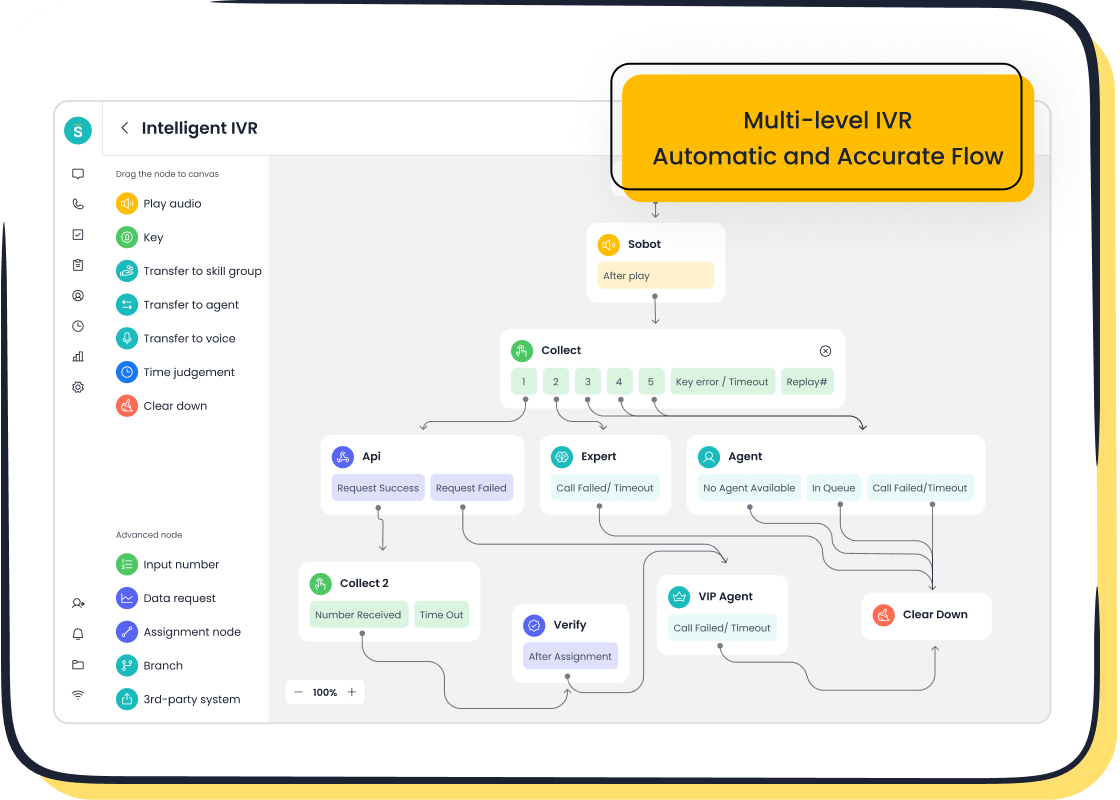Call Center from Home: How to Begin Your Remote Career

Ready to start your journey as a remote call center agent? You can easily begin a call center from home job if you have a quiet workspace, basic equipment, and a willingness to learn. Many people choose remote call center agent roles because they want less stress, a better work-life balance, and more options for where they work. As a call center agent, you avoid long commutes, save money, and enjoy more control over your schedule. Sobot and Sobot AI make it simple to set up your Sobot call center and succeed in your work from home career.
Here’s why so many people love remote work:
- More flexibility and convenience
- Higher productivity in a comfortable space
- Reduced commuting costs and stress
Requirements

Workspace Setup
Setting up your workspace is the first step to becoming a successful call center agent from home. You want a spot that helps you focus and keeps distractions away. Here’s what you should look for:
- Choose a quiet area in your home. Try to avoid places with lots of background noise or interruptions.
- Pick a space where you can close the door or set up a divider. This helps keep your calls private and your screen safe from prying eyes.
- Use a sturdy desk and a comfortable chair. Sitting for long periods can be tough, so an ergonomic setup keeps you feeling good and working well.
- Make sure your workspace has good lighting. It helps you stay alert and look professional during video calls.
- Test your equipment before you start. Check your computer, internet speed, and headset to make sure everything works smoothly.
Tip: Many call center agents find that having a dedicated workspace helps them switch into “work mode” and stay productive throughout the day.

Sobot Voice/Call Center makes it easy to work from anywhere. Its unified workspace lets you handle calls, messages, and customer info all in one place. You don’t need a fancy office—just a reliable setup and the right tools.
Equipment Needed
You don’t need a lot of expensive gear to get started as a remote call center agent. Most people can set up with just a few essentials. Here’s a quick checklist:
| Equipment Category | Why You Need It |
|---|---|
| Computer or Laptop | Runs your call center software and business tools without lag. |
| High-Speed Internet | Keeps your calls clear and stable. Aim for at least 10 Mbps download speed. |
| Noise-Cancelling Headset | Blocks out background noise and keeps your hands free for typing or note-taking. |
| Privacy Screen (optional) | Protects sensitive customer information on your screen. |
| Ergonomic Desk & Chair | Keeps you comfortable and focused during long shifts. |
| Two-Factor Authentication | Adds extra security for your login and customer data. |
| Backup Power (UPS) | Prevents you from losing connection during a power outage. |
Most remote call center agent jobs only require you to have a headset and a computer. Some companies even give you a monthly stipend—usually between $50 and $150—to help cover these costs. You won’t need to buy expensive servers or phones. Cloud-based solutions like Sobot Voice/Call Center handle all the heavy lifting for you. You just log in and start working.
Sobot’s platform also includes built-in security features, like encrypted data transfer and two-factor authentication, so you can keep customer information safe. The unified workspace means you don’t have to switch between different apps or screens. Everything you need is right there, making your job as a call center agent much easier.
Note: Always check your internet speed before your first shift. A slow connection can cause dropped calls and frustrated customers.
Skills for Success
You don’t need years of experience to become a great remote call center agent, but a few key skills will help you stand out:
- Communication: Speak clearly and listen carefully. Customers want to feel heard and understood.
- Problem-Solving: Stay calm when things get tricky. Find solutions quickly and keep the customer happy.
- Technical Know-How: Get comfortable with call center software, ticketing systems, and basic troubleshooting. Sobot’s unified workspace is user-friendly, so you can learn fast.
- Product Knowledge: Learn about the company’s products and services. This helps you answer questions and solve problems on the spot.
- Time Management: Stay organized and manage your time well. Remote work gives you freedom, but you need to stay on track.
- Adaptability: Be ready to learn new tools, like AI-powered chatbots or automation features. Sobot’s platform uses smart technology to make your job easier, so being open to new things is a big plus.
Many call center agents use AI tools to handle routine questions and analyze customer data. Sobot’s Voice/Call Center includes these features, so you can focus on helping customers with more complex needs. If you’re comfortable with technology, you’ll find it easy to pick up new skills and grow in your role.
Pro Tip: Practice using your headset and software before your first day. The more familiar you are with your tools, the more confident you’ll feel when helping customers.
With the right workspace, equipment, and skills, you can start your journey as a remote call center agent and enjoy a flexible, rewarding career. Sobot’s solutions are designed to support you every step of the way, from setup to daily work.
Job Search
Looking for your first call center from home job can feel overwhelming, but you have lots of great options. Many companies now hire remote call center agents, and you can find these jobs on trusted websites. Let’s break down where to look, what to watch for, and how to stay safe during your search.
Where to Find Jobs
You can start your search for remote call center agent positions on several popular job boards. These sites list thousands of call center jobs, including full-time, part-time, and contract roles. Here are some of the best places to look:
- We Work Remotely: This site connects over 130,000 people each month with remote jobs, including customer service and call center agent roles. You can sign up for job alerts and find both full-time and part-time work.
- FlexJobs: FlexJobs offers pre-screened remote jobs in over 50 categories. You’ll find many call center from home opportunities here, and the site focuses on work-life balance.
- Virtual Vocations: This platform features telecommuting jobs, including remote call center agent positions. You can register for free or pay for extra features like instant job alerts.
- Remotive: Remotive sends out a bi-monthly newsletter with a list of remote jobs, including support and call center agent roles.
- JustRemote: This site covers many remote job types and has a special “PowerSearch” tool to help you find hidden call center jobs.
- Remote.co: You’ll find hand-picked remote call center agent jobs here, sorted by job type.
- Jobspresso: This board lists freelance and full-time remote jobs, including customer support and call center agent positions.
- Other good sites include Skip the Drive, Pangian, Remote OK, and Working Nomads. These platforms offer curated job listings and newsletters for remote work.
You can also check company websites directly. Many businesses, especially those using modern contact center solutions like Sobot, post openings for remote call center agent roles on their own careers pages. Sobot serves well-known brands across industries, so you may find jobs with companies that trust Sobot’s technology for their customer support teams. This means you’ll work with reliable systems and have a smoother experience from day one.
Tip: Use search terms like “call center from home,” “remote call center agent,” and “remote call center jobs” to find the most relevant listings.
What to Look For
When you read job descriptions, pay attention to the details. The best remote call center agent jobs offer more than just a paycheck. Here’s what you should look for:
- Weekly pay: Many call center jobs pay weekly, which helps you manage your budget.
- Flexible schedules: Look for jobs that let you choose your hours or offer shifts that fit your lifestyle. Flexibility is a big reason people choose to work from home.
- Support and training: Good companies provide training and give you a contact person for help. Sobot-powered teams often get access to advanced training and support tools, making your job easier.
- Growth opportunities: Some companies offer chances to move up or learn new skills. If you want to grow your career as a call center agent, look for jobs that mention promotions or skill development.
- Local job options: Some remote call center jobs let you work for companies in your area, even if you never go to the office.
Here’s a quick checklist to help you compare call center from home jobs:
| What to Look For | Why It Matters |
|---|---|
| Weekly Pay | Helps you get paid faster |
| Flexible Hours | Lets you balance work and life |
| Training Provided | Makes it easier to start and succeed |
| Support Contact | Gives you someone to ask for help |
| Career Growth | Opens doors for future promotions |
| Secure Technology | Keeps your work and customer data safe |
Sobot’s trusted brand reputation means that companies using its solutions care about quality and security. If you see a job mentioning Sobot or advanced cloud call center tools, you know the company values efficiency and customer satisfaction. You can learn more about Sobot’s industry presence and solutions on Sobot’s official website.
Avoiding Scams
Not every remote call center agent job is real. Scammers sometimes post fake jobs to steal your information or money. You can protect yourself by watching for these warning signs:
- The job promises huge pay for little work, like $3,000 a week for entry-level tasks.
- You get an instant job offer without an interview or background check.
- The company asks for your Social Security number or bank details too soon.
- The company’s website looks new, has errors, or doesn’t match the job description.
- You feel rushed or pressured to accept the job right away.
- The job description is vague or the emails are unprofessional.
- You’re asked to pay for equipment, training, or admin fees.
- The company uses personal email addresses or misspells its own name.
- Interviews happen only through instant messaging apps, not video or phone calls.
- The company has no real online presence or uses a website that isn’t secure (look for HTTPS).
Note: Always research the company before you apply. Check their website, LinkedIn, and reviews. Never pay for a job or share personal info until you’re sure the offer is real.
If you want extra peace of mind, stick to established job boards and apply directly through company websites. Trusted brands like Sobot work with companies that value security and professionalism. Sobot’s clients include well-known names in retail, finance, and technology, so you can feel confident when you see their name in a job listing.
Finding a real remote call center agent job takes a little effort, but you can do it. Use trusted sites, read job descriptions carefully, and trust your instincts. With the right approach, you’ll land a call center from home job that fits your needs and helps you start a rewarding career.
Hiring Process

Starting your journey as a remote call center agent means going through a few important steps. Companies want to make sure you have the right skills and attitude for the job. Here’s what you can expect during the hiring process.
Application Steps
You usually begin by filling out an online application. The company will ask about your work history, your schedule, and why you want to become a call center agent. After you submit your application, the hiring team reviews your details and checks if you match their needs. They might ask you to complete a quick skills test or answer a few questions about your experience.
Here’s a simple breakdown of the steps you’ll likely follow:
- Fill out the online application and upload your resume.
- Complete a short skills assessment or answer screening questions.
- Discuss your work schedule, contract type, and salary expectations.
- Share your availability and confirm you can work in the right time zone.
- Wait for the team to review your application and give feedback.
Tip: Always double-check your application for errors before you submit. A clear and honest application helps you stand out.
Interviews
If you pass the first round, you’ll get invited to an interview. Many remote call center agent interviews happen over video or phone. The interviewer wants to see how you communicate and solve problems. You might get a few role-play scenarios or real-time questions to test your skills.
Some companies use structured interviews, like the STAR method, to keep things fair. They may also use technology to schedule interviews across different time zones. This helps you and the company find a time that works for everyone.
During the interview, you’ll talk about your teamwork style, how you handle tough customers, and how you use technology. The team will look for a good fit with their company culture.
Training
Once you get the job offer, you’ll start the onboarding process. Most companies send you pre-boarding materials before your first day. You’ll learn about the company’s values, your new role, and who you’ll work with.
Training for a remote call center agent often includes virtual lessons, practice calls, and hands-on activities. You’ll get to know the call center software, like Sobot’s unified workspace, and learn how to handle customer questions. Sobot supports new agents with easy-to-follow training resources and onboarding guides, so you feel ready from day one.
Onboarding can last a few days or even a few months, depending on the company. You’ll get ongoing support and feedback to help you grow in your role. With Sobot’s tools and resources, you can build your confidence and become a top-performing remote call center agent.
Getting Hired
Resume Tips
You want your resume to stand out when you apply for a remote call center agent job. Start with a clear summary that shows your interest in remote work. Use strong action verbs like "Communicated," "Resolved," and "Collaborated" to describe your experience. Focus on your achievements, not just your duties. For example, you can mention that you maintained a 95% customer satisfaction score or resolved 90% of inquiries on the first contact.
List both hard and soft skills. Show your technical troubleshooting abilities and your empathy with customers. Highlight your experience with remote tools such as Slack, Zoom, or Asana. Organize your resume with clear sections for experience, skills, education, and awards. Keep your education section short and relevant. Always tailor your resume to match the job description.
Tip: Proofread your resume and use a professional format. Recruiters notice details.
Interview Prep
Interviews for call center agent roles often happen online. You should prepare to talk about how you motivate yourself and manage your time in a remote setting. Be ready to share examples of how you solved problems or improved team performance. Discuss your experience with remote work tools and customer service technology.
Expect questions about handling tough customers, tracking performance, and working with remote teams. Show that you can work independently but also know when to ask for help. Mention how you use KPIs like Average Handle Time and First Call Resolution to improve results. Practice answering questions about conflict resolution and building rapport with customers.
Note: Follow up after your interview with a thank-you email. This shows initiative and professionalism.
Certifications
Certifications can help you get noticed as a remote call center agent. Employers value certifications that show your commitment and skills. Some top certifications include Certified Pharmacy Technician (CPhT), Professional Credit Associate (PCA), and HIPAA Professional (HIPAAP). These can give you an edge and may lead to higher pay.
Sobot offers AI-powered training resources to help you grow. You get access to over 400 AI certifications, 250+ video courses, and thousands of AI tools. These resources help you master customer support skills and stay competitive in the remote job market. Sobot’s platform makes it easy to learn and earn certifications that matter for your career.
Starting Out
First Day
Your first day as a remote call center agent can feel exciting and a little overwhelming. You want to start strong, so here’s what helps most new agents succeed:
- Complete any paperwork before your start date. This lets you focus on learning, not forms.
- Get your headset, computer, and workspace ready ahead of time.
- Join a team introduction or icebreaker to meet your coworkers and feel welcome.
- Expect a light training session that covers the company’s mission, values, and customer service approach.
- Learn about the tools you’ll use, like Sobot Voice/Call Center, so you feel confident from the start.
Weee!, a leading online supermarket, used Sobot Voice/Call Center to make onboarding smooth and efficient. Here’s how Sobot helped Weee! agents hit the ground running:
| Metric / Feature | Description / Impact |
|---|---|
| Agent Efficiency Increase | 20% faster onboarding and better customer interactions |
| Resolution Time Reduction | 50% quicker problem-solving and support |
| Customer Satisfaction Score | 96% satisfaction during onboarding and support |
| Flexible IVR | Easy call routing for different customer needs |
| Multilingual Support | Helped agents serve customers in many languages |
| AI-powered Voicebot | Handled routine questions, so agents focused on complex tasks |
| Integration with Ticketing | Reduced system switching, making onboarding easier |
| AI Copilot Features | Suggested replies and summaries for faster, more accurate responses |
You can see how the right tools and support make your first day much easier.
Daily Routine
A remote call center agent’s day follows a steady rhythm. You log in, check your schedule, and get ready for calls. You handle both inbound and outbound calls using cloud-based tools. You stay at your desk to answer customer questions quickly. Your day includes scheduled breaks for food and rest.
You use advanced systems like IVR, CRM helpdesks, and knowledge bases to solve problems and follow scripts. Each call has time and quality standards. Your performance is tracked with clear goals and KPIs. You might join quick team meetings or training sessions to stay sharp. Gamification and rewards keep you motivated and engaged.
Remote work means no commute, but your routine stays focused on helping customers and meeting targets. Tools like Sobot’s unified workspace and AI-powered features help you stay organized and efficient.
Growth Opportunities
You can grow your career as a remote call center agent in many ways. Start by building strong communication skills—listen well, speak clearly, and show empathy. Manage your time, set goals, and keep learning about new tools and products.
Many companies, including those using Sobot’s omnichannel solutions, offer training programs to help you learn customer service, technology, and leadership skills. You can join virtual meetings, team-building activities, and online forums to connect with others. Some agents move into leadership roles or specialize in areas like quality assurance or training.
Sobot’s platform supports your growth by giving you access to AI-powered training, performance data, and a unified workspace. You can track your progress, earn certifications, and take on new challenges—all from your remote office.
Tip: Stay curious and keep learning. The more skills you build, the more opportunities you’ll find in the remote call center world.
You can start your call center from home journey by following a few simple steps:
- Research companies and use job boards to find work from home call center jobs.
- Tailor your resume and practice interview skills.
- Set up a reliable workspace and learn key soft skills like patience and multitasking.
- Explore Sobot’s solutions to boost your success and growth.
A remote call center career offers flexibility, steady pay, and real opportunities to grow.
FAQ
What is a call center from home job?
A call center from home job lets you answer calls, help customers, and solve problems—all from your own house. You use cloud-based tools like Sobot Voice/Call Center to connect with customers and your team.
What equipment do I need to start?
You need a computer, a high-speed internet connection, and a noise-canceling headset. Sobot’s platform works on most devices, so you don’t need fancy hardware. A comfortable chair and desk help, too.
How does Sobot help remote call center agents?
Sobot gives you a unified workspace. You can manage calls, messages, and customer info in one place. The platform uses AI to help you answer questions faster and track your performance.
Tip: Sobot’s cloud call center keeps your work secure and easy to access from anywhere.
Can I work flexible hours in a call center from home job?
Yes! Many companies let you pick your shifts or work part-time. Sobot’s tools support teams in different time zones, so you can find a schedule that fits your life.
Is training provided for new remote agents?
Most companies offer training before you start. Sobot’s onboarding resources and AI-powered guides help you learn the software and get comfortable with your daily tasks.
See Also
Advantages And Disadvantages Of Working Remotely In Call Centers
Understanding The Concept Of A Remote Call Center
Leading Ten Companies Hiring For Remote Call Center Jobs
